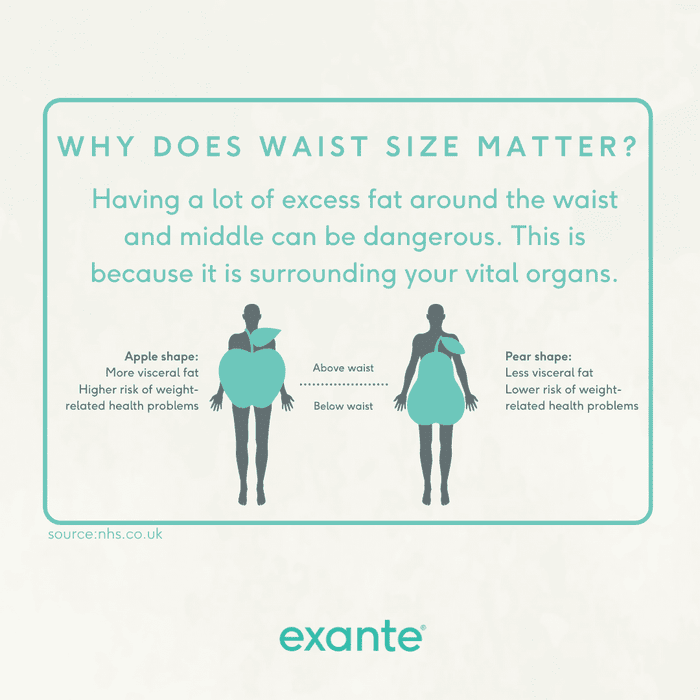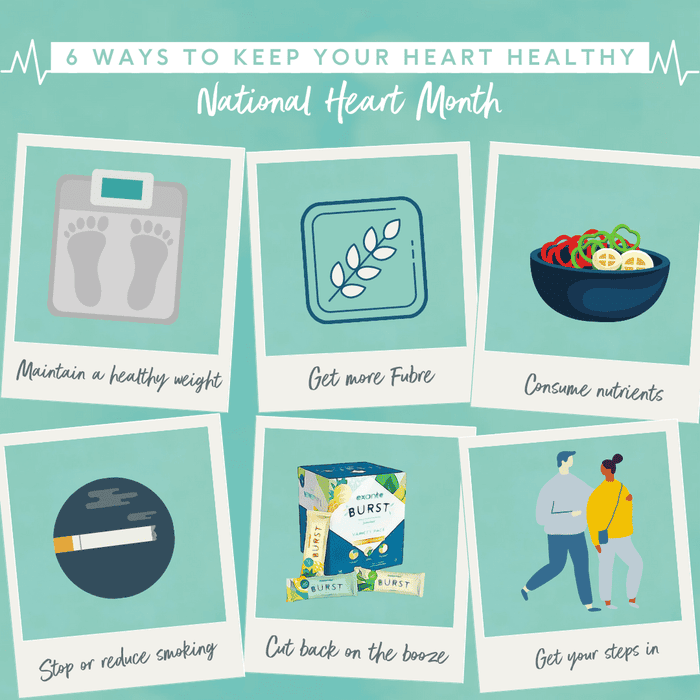
Our heart health is important all year round, but February is the month where we pay special attention and raise awareness on all things heart health.
This post outlines 9 lifestyle changes we can make to help protect our heart and keep it healthy.
A diet that is healthy for the heart can, not only help us maintain a healthy body weight, but also lower our blood pressure, reduce our levels of cholesterol and decrease our risk of developing type 2 diabetes [1].
So, what does a heart-friendly lifestyle look like?
Maintain a healthy weight
Managing your weight can reduce your risk of heart disease by preventing weight related conditions like high cholesterol, high blood pressure and type 2 diabetes [2]. To check if you need to lose weight you can use a BMI calculator to check your BMI. Or you can measure your waist - It’s generally recommended that a desirable waist size for men = less than 94cm, and for women = less than 80cm.
Having a lot of excess fat around your middle can put you at higher risk of coronary heart disease, type 2 diabetes and some cancers. That’s because people who are a more apple shape, tend to have more hidden fat, known as visceral fat, that covers the organs, like the heart and liver [3].
To help control your weight, try following one of our exante diet plans – we've got different ones to suit difference lifestyles. We’ve even got a diet plan that could help control your type 2 diabetes!

Get more fibre
Research suggests that high fibre intake has beneficial impacts on cardio vascular disease risk factors [4]. In the UK, the recommended daily intake of fibre is 30g - most adults in the UK consume much less [5].
Well, we’ve got your back. All of our exante products are not only mouth-wateringly indulgent, they’re also high in fibre – bonus, right!?
If you’re following one of our partial meal replacement plans, like our exante 1200 diet plan, or 5:2 diet plan, remember to pack your prepared meals with a variety of veggies and whole grains to ensure your body is getting all the fibre it needs.
Eat your 5 a day
Eating a variety of fruit and veg everyday provides the body with the vitamins, antioxidants and fibre it needs to stay healthy – nuts, seeds and pulses count too!
Our exante products are enriched with all the essential nutrients, so that your body can still get everything it needs whilst following a low-calorie plan.
Reduce saturated fat
Saturated fats are the types of fat that increase our blood cholesterol. Why does that matter? Well, high levels of LDL, or “bad” cholesterol can build up in our arteries and restrict the flow of blood to the heart, increasing the risk of having a heart attack.
Saturated fats are normally found in foods like meat, dairy and pastries, whereas unsaturated fats are found in plant sources, like oils, nuts and seeds and avocados.
You can find an abundance of healthy recipes here.

Keep your eye on the salt
To prevent high blood pressure, try to reduce the amount of salt you add to your food.
A great tip is to add your salt when you’ve finished cooking, when we add salt during cooking, the flavours tend to get lost, making us likely to add more. It can also be good to use reduced or low salt alternatives, like seaweed flakes, reduced salt soy sauce, and reduced salt stocks and gravies.
Another tip is to avoid having salt at the dinner table and put it in an inconvenient place. That way you’re less likely to reach for it.
The recommended maximum daily amount for adults is 6g, which is equal to around 1 teaspoon [1]. But remember, salt can easily be hidden in processed foods such as snacks, ready meals, bread and even cereal. So, it’s always worth checking the label and keeping an eye on how much salt you’re consuming throughout the day.
Check out our exante eBooks for healthy some meal inspirations.
2 X fish
Eat at least 2 portions of fish a week and make one of them oily, like mackerel, salmon, sardines or pilchards. Oily fish is a great source of omega 3, which could help protect against heart disease [6]. Try our healthy, omega-3 packed fish pie and filo pastry recipe.
For vegans and vegetarians, there are also some good plant sources of omega 3, such as walnuts and rapeseed oil.
Stop or reduce smoking
Smoking is one of the leading causes of coronary heart disease. Research suggests that there is a 5.6% increased risk of a non-fatal heart attack for each cigarette smoked [7].
The best thing you can do to protect your heart and keep it as healthy as possible, is to stop smoking [8].
Cut back on the booze
A regular tipple can put strain on your heart and cause your arteries to constrict, this leads to high blood pressure which can increase your chanced of having a heart attack or stroke [9].
The current guidance in the UK, is that both men and women should aim to have no more than 14 units of alcohol a week.
We’ve got plenty of blog posts giving great advice on ways to cut back on alcohol. Better yet, have you tried out our latest BURST mocktail range?
Get moving
The government recommends adults in the UK to aim for around 150 minutes of moderate physical activity a week, which could be taking a 30 minute walk every day. Or 75 minutes of vigorous activity a week, which could be going for a run or a cycle a few days a week. There are loads of different ways we can exercise, without spending a penny!
Some of our exante diet plans do not recommend people to do strenuous activity. Click here for guidance on exercise whilst doing an exante diet plan.
As with everything, actions speak louder than words. It’s worth being aware of all the things we can do to benefit our heart health, but the power comes when we put knowledge into practice. We know this isn’t always easy, that’s why we’re constantly posting across all our social media platforms to keep you motivated.
Not only that, we’ve also got a closed Facebook group where you can interact with thousands of other people sharing stories of their journey and tips and tricks on all kinds of topics.
- Heart Health (bda.uk.com)
- Managing your weight – cut your risk of heart conditions | BHF
- Your weight and heart and circulatory conditions – BHF
- Fiber and cardiovascular disease risk: how strong is the evidence? – PubMed (nih.gov)
- How to get more fibre into your diet – NHS (www.nhs.uk)
- Healthy body – NHS (www.nhs.uk)
- camquit-heart-disease-factsheet.pdf
- Smoking – British Heart Foundation (bhf.org.uk)
- Alcohol and heart disease | Drinkaware









